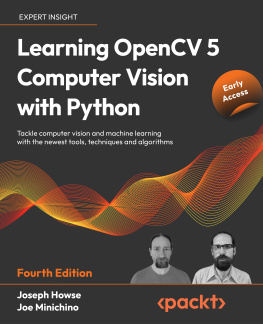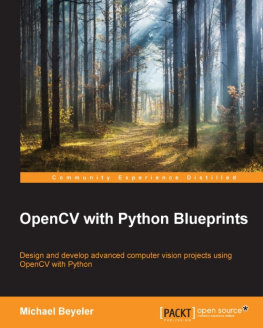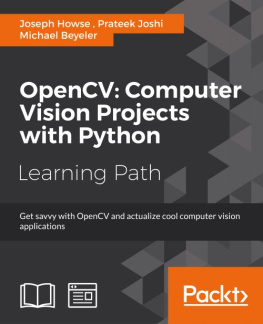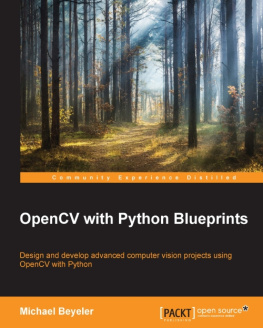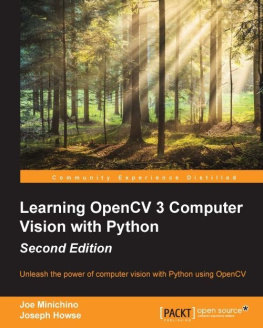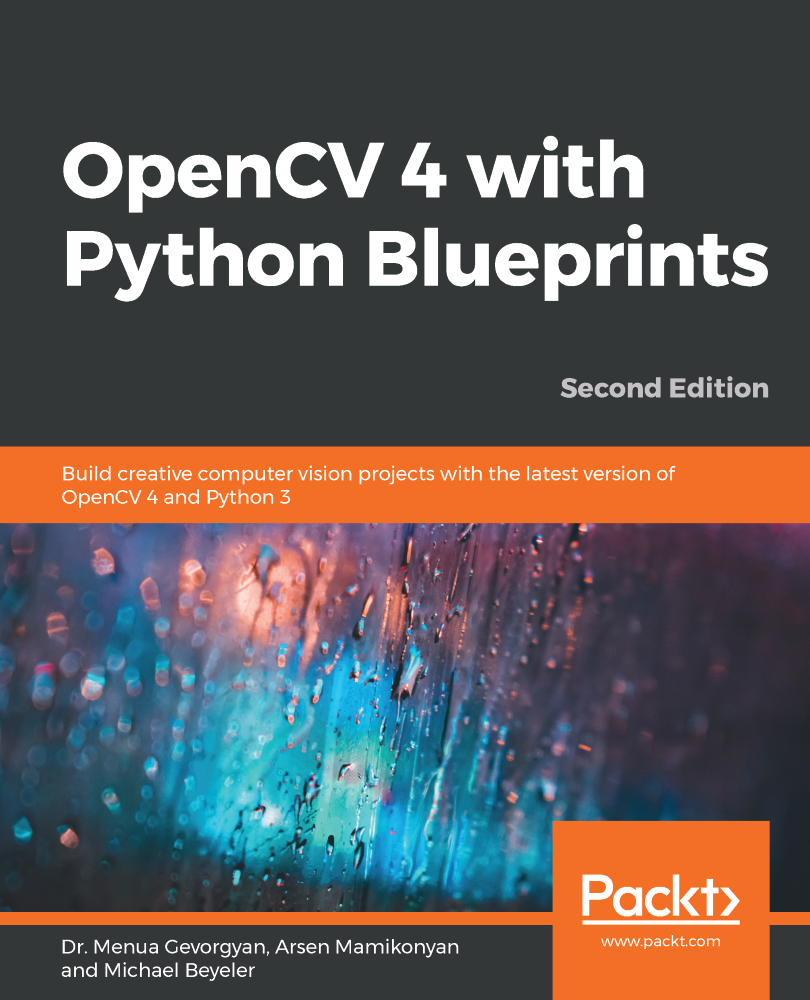
OpenCV 4 with
Python Blueprints
Second Edition
Build creative computer vision projects with the latest version of OpenCV 4 and Python 3
Dr. Menua Gevorgyan
Arsen Mamikonyan
Michael Beyeler

BIRMINGHAM - MUMBAI
OpenCV 4 with Python BlueprintsSecond Edition
Copyright 2020 Packt Publishing
All rights reserved. No part of this book may be reproduced, stored in a retrieval system, or transmitted in any form or by any means, without the prior written permission of the publisher, except in the case of brief quotations embedded in critical articles or reviews.
Every effort has been made in the preparation of this book to ensure the accuracy of the information presented. However, the information contained in this book is sold without warranty, either express or implied. Neither the authors, nor Packt Publishing or its dealers and distributors, will be held liable for any damages caused or alleged to have been caused directly or indirectly by this book.
Packt Publishing has endeavored to provide trademark information about all of the companies and products mentioned in this book by the appropriate use of capitals. However, Packt Publishing cannot guarantee the accuracy of this information.
Commissioning Editor: Richa Tripathi
Acquisition Editor: Denim Pinto
Content Development Editor: Rosal Colaco
Senior Editor: Afshaan Khan
Technical Editor: Ketan Kamble
Copy Editor: Safis Editing
Project Coordinator: Francy Puthiry
Proofreader: Safis Editing
Indexer: Priyanka Dhadke
Production Designer: Aparna Bhagat
First published: October 2015
Second edition: March 2020
Production reference: 1190320
Published by Packt Publishing Ltd.
Livery Place
35 Livery Street
Birmingham
B3 2PB, UK.
ISBN 978-1-78980-181-1
www.packt.com
Packt.com
Subscribe to our online digital library for full access to over 7,000 books and videos, as well as industry leading tools to help you plan your personal development and advance your career. For more information, please visit our website.
Why subscribe?
Spend less time learning and more time coding with practical eBooks and Videos from over 4,000 industry professionals
Improve your learning with Skill Plans built especially for you
Get a free eBook or video every month
Fully searchable for easy access to vital information
Copy and paste, print, and bookmark content
Did you know that Packt offers eBook versions of every book published, with PDF and ePub files available? You can upgrade to the eBook version at www.packt.com and as a print book customer, you are entitled to a discount on the eBook copy. Get in touch with us at customercare@packtpub.com for more details.
At www.packt.com , you can also read a collection of free technical articles, sign up for a range of free newsletters, and receive exclusive discounts and offers on Packt books and eBooks.
Contributors
About the authors
Dr. Menua Gevorgyan is an experienced researcher with a demonstrated history of working in the information technology and services industry. He is skilled in computer vision, deep learning, machine learning, and data science as well as having a lot of experience with OpenCV and Python programming. He is interested in machine perception and machine understanding problems, and wonders if it is possible to make a machine perceive the world as a human does.
I would like to thank Rosal Colaco, for the dedicated work to improve the book's quality, as well as Sandeep Mishra, for proposing the book.
Arsen Mamikonyan is an experienced machine learning specialist with demonstrated work experience in Silicon Valley and London, and teaching experience at the American University of Armenia. He is skilled in applied machine learning and data science and has built real-life applications using Python and OpenCV, among others. He holds a master's degree in engineering (MEng) with a concentration on artificial intelligence from the Massachusetts Institute of Technology.
I would like to thank my wife, Lusine, and my parents, Gayane and Andranik, for encouraging and putting up with me while I was writing this book. I would like to thank my coauthor, Menua, for bearing with my hectic work schedule and keeping my motivation high while we worked on this project.
Michael Beyeler is a postdoctoral fellow in neuroengineering and data science at the University of Washington, where he is working on computational models of bionic vision in order to improve the perceptual experience of blind patients implanted with a retinal prosthesis (bionic eye).
His work lies at the intersection of neuroscience, computer engineering, computer vision, and machine learning. He is also an active contributor to several open source software projects, and has professional programming experience in Python, C/C++, CUDA, MATLAB, and Android. Michael received a PhD in computer science from the University of California, Irvine, and an MSc in biomedical engineering and a BSc in electrical engineering from ETH Zurich, Switzerland.
About the reviewer
Sri Manikanta Palakollu is an undergraduate student pursuing his bachelor's degree in computer science and engineering at SICET under JNTUH. He is a founder of the OpenStack Developer Community in his college.
He started his journey as a competitive programmer. He loves to solve problems related to the data science field. His interests include data science, app development, web development, cybersecurity, and technical writing. He has published many articles on data science, machine learning, programming, and cybersecurity with publications such as Hacker Noon, freeCodeCamp, Towards Data Science, and DDI.
Packt is searching for authors like you
If you're interested in becoming an author for Packt, please visit authors.packtpub.com and apply today. We have worked with thousands of developers and tech professionals, just like you, to help them share their insight with the global tech community. You can make a general application, apply for a specific hot topic that we are recruiting an author for, or submit your own idea.
Preface
The goal of this book is to get you hands-on with a wide range of intermediate to advanced projects using the latest version of the OpenCV 4 framework and the Python 3.8 language instead of only covering the core concepts of computer vision in theoretical lessons.
This updated second edition has increased the depth of the concepts we tackle with OpenCV. It will guide you through working on independent hands-on projects that focus on essential computer vision concepts such as image processing, 3D scene reconstruction, object detection, and object tracking. It will also cover, with real-life examples, statistical learning and deep neural networks.
Next page

